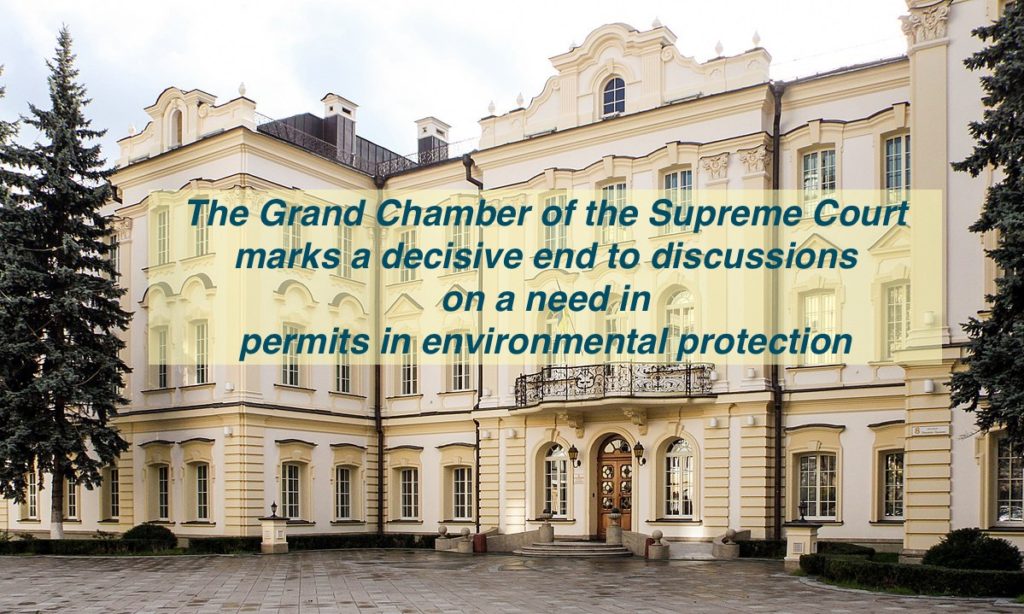Operation without obtaining relevant permits, if required, even if there is no procedure in place for their issue, is prohibited.
This is the first of the conclusions of the resolution of the Grand Chamber of the Supreme Court in the case of EPL to protect dolphins. The full text of the judgement in the Case No. 910/8122/17 is available at http://reyestr.court.gov.ua/Review/78977479
Very often in the sphere of environmental protection there are cases, when operation having impact on the environment is performed with no permits whatsoever, even if it is stipulated by the law. This is explained by the fact that the governmental authorities do not adopt relevant by–laws regulating a procedure of obtaining permits. Thus, situations occur when operation allowed pursuant to permits only is performed illegally. Law enforcement bodies, in their turn, do not “notice” such illegality, justifying their “blindness” by the absence of procedures for obtaining such permits.
The Grand Chamber of the SC did not agree with the set practice of performing operation without obtaining relevant permits, justifying this and referring to the by-laws as follows.
By using common bottlenose dolphins in entertainment events, “Aquadelf” Ltd performs operation in violation of part five of article 25 of the Law “On protection of animals from animal cruelty”. This article, in particular, prohibits operation of a dolphinarium without permits.
According to the Law of Ukraine “On environmental protection”, the following is subject to the state protection and regulation in Ukraine: the environment as a total of natural and natural–social conditions and processes, natural resources, both those involved in commercial turnover and currently non-commercial, including animal world.
Based on the principles of environmental protection, as stated in article 38 of the Law “On environmental protection”, citizens, enterprises, institutions and organizations may possess, use or lease natural resources based on special permits only.
The Law of Ukraine “On animal world”, which provisions stipulate protection from animal suffering and death caused by cruelty to animals, protection of their natural rights and strengthening of moral and humanity of people, preservation and improvement of the habitat of wild animals, and ensuring conditions for preservation of whole species and population biodiversity of animals (preamble and article 2), sets forth requirements for special use of animal world objects. This can be implemented only by obtaining a special permit for a fee (article 17).
The regulation on the procedure for permit issue for special use of natural resources within the areas and facilities of the nature protected fund and establishment of limits for use of resources of national significance, as approved by the Decree of the Cabinet of Ministers of Ukraine of August 10, 1992 No. 459 (hereinafter referred to as the Procedure), establishes that natural resources, a permit for special use of which is issued, include: animals and marine mammals in the wild, as well as other animal world objects, classified as natural resources of national significance; species of animals and plants listed in the Red Data Book of Ukraine (clause 2).
Article 5 of the Law of Ukraine “On the Red Data Book of Ukraine” establishes that objects of the Red Data Book of Ukraine belong to natural resources of national significance and are subject to special protection all over Ukraine within the boundaries of its continental shelf and exclusive (maritime) economic zone. Issue of permits for special use of natural resources, including species of animals and plants listed in the Red Data Book of Ukraine, is conducted by regional, Kyiv and Sevastopol city state administrations, executive body of the Autonomous Republic of Crimea for environmental protection (clause 4 of the Procedure).
According to article 8 of the Law of Ukraine “On protection of animals from cruelty”, maintenance of wild animals in captivity is allowed subject to a permit issued by the central body of the executive authorities implementing the state policy in the field of environmental protection.
Therefore, according to the requirements of the environmental law, business entities, as well as other entities, may use wild animals taking into account the above legislative provisions, namely: based on a relevant permit. Availability of such a permit should warrant that such use is performed under mandatory observance of environmental standards, regulations and limits for their use; ensuring preservation of space and species diversity of animal world; with actions taken to prevent damage to and exhaustion of the objects of animal world and the negative impact on the state of the environment as a whole; operation being conducted without violating environmental rights of other parties.
Taking into account the above, the Grand Chamber of the SC concludes that the statement of “Aquadelf” Ltd on the absence of permits due to legal loopholes is unjustified. As established by the court of the first instance and not contested by the court of appeal, the responded has not obtained relevant permits.
So, the Grand Chamber of the SC determined that the lack of a special procedure of permit issue as set by the current law does not entitle business entities to operate using wild animals without relevant permits, as it is prohibited by the law.
This conclusion may be extended to other relationships what concerns special use of natural resources without obtaining necessary permits!


